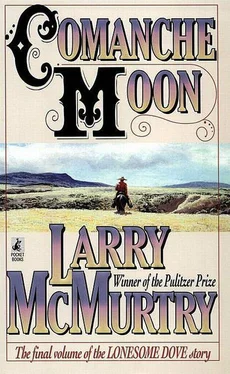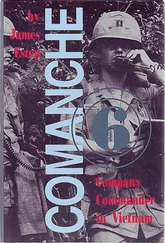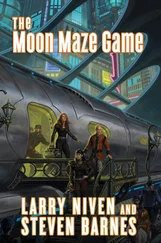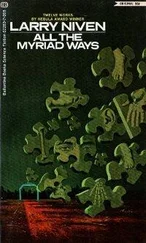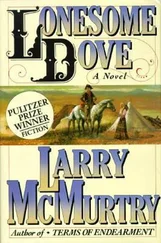He knew it was foolish to be thinking that way.
Famous Shoes had scouted for many years and had never scalped anybody. But Pea Eye's mind wouldn't behave. The part of it that was sensible knew that Famous Shoes meant him no harm; but another part of his mind kept bringing up pictures of Indians with scalping knives. He was annoyed with his mind--it would be a lot easier to do his task well if his mind would just behave and not keep making him scared.
Late in the night, while the young ranger dozed, Famous Shoes heard some geese flying overhead, and he began to sing a long song about birds. Of course he sang the song in his own Kickapoo tongue, which the young white man could not understand. Famous Shoes knew that the ^ws of the song would be mysterious to the young man, who had awakened to listen, but he sang anyway. That things were mysterious did not make them less valuable. The mystery of the northward-flying geese had always haunted him; he thought the geese might be flying to the edge of the world, so he made a song about them, for no mystery was stronger to Famous Shoes than the mystery of birds. All the animals that he knew left tracks, but the geese, when they spread their wings to fly northward, left no tracks. Famous Shoes thought that the geese must know where the gods lived, and because of their knowledge had been exempted by the gods from having to make tracks.
The gods would not want to be visited by just anyone who found a track, but their messengers, the great birds, were allowed to visit them. It was a wonderful thing, a thing Famous Shoes never tired of thinking about.
When Famous Shoes finished his song he noticed that the young white man was asleep.
During the day he had not trusted enough, and had worn himself out with pointless scurryings. Perhaps even then the song he had just sung was working in the young man's dreams; perhaps as he grew older he would learn to trust mysteries and not fear them. Many white men could not trust things unless they could be explained; and yet the most beautiful things, such as the trackless flight of birds, could never be explained.
The next morning, when the first gray light came, Pea Eye awoke to find that he had not been scalped or hurt. He felt so tired and so grateful that he didn't move at once.
Famous Shoes squatted by the campfire, bringing the coffee to a boil. Pea Eye wanted to be helpful, but he felt as if his joints had turned to glue. He sat up, but felt incapable of further movement.
Famous Shoes drank coffee as if he were drinking water, although, to Pea Eye's taste, the coffee was scalding.
"I am leaving now," Famous Shoes said.
"You do not have to go where I go. Just travel to the west." "What? I won't see you at all?" Pea Eye asked. Never since joining the rangers had he spent a whole day alone, in wild country.
Even if he hadn't been feeling that his joints had melted, the prospect would have alarmed him.
If he met a party of Comanches, he would be lost.
"You haven't seen no Indian sign, have you?" he asked.
Famous Shoes was not in the mood for conversation just then. There was a ridge to the north that had some curious black rocks scattered around it; he wanted to examine those black rocks. The sky to the east was white now--it was time to start.
"No, there are no Indians here, but there is an old bear who has a den in that little mountain," he said, pointing toward a small hill just to the west. "You should be careful of that bear--he might try to eat your horse." "The rascal, I'll shoot him if he tries it," Pea Eye said, but with his joints so gluey he didn't feel confident that he could kill a bear.
Determined to make a show of competence, he stood up.
"I will find you when the evening star shines," Famous Shoes said. "Bring the coffeepot." Then he slipped into the grayness. Pea Eye sipped his coffee, which was still barely cool enough to drink; but he kept his hand on his rifle while he sipped, in case the surly old bear was closer than Famous Shoes thought.
When Augustus left Austin he had no aim, other than to ride around for a while, alone.
To be in Austin was to be under orders: the Governor was always summoning them or sending them off, consulting with them or pestering them about details of finance that Augustus had not the slightest interest in.
As a rule he did not, like his friend Call, enjoy solitude. Woodrow was virtually incapable of spending a whole evening in the company of his fellow men--or women either, if Maggie's account was to be trusted. At some point in the evening Woodrow Call would always quietly disappear.
He would slip off in the night, ostensibly to stand guard, when there was not a savage within one hundred miles. Prolonged stretches of company seemed to oppress him.
With Augustus it was the opposite. When night fell, if he was in town, he wanted company, the livelier the better; he sought it and he found it, whether it involved a card game, a few talky whores, a singsong, or just a session of bragging and tale telling with whatever gamblers and adventurers happened to be around. He had never particularly liked to sleep, and rarely did for more than three or four hours a night. Even that necessity he begrudged. Why just lay there, when you could be living?
A little rest at night was needful, but the less the better.
Now, though, his lovely Nellie's death had arrested, for the moment, his taste for company; it seemed to him that he had been under orders for his entire life, and he was tired of it. Once it had been captains who ordered him around; now it was governors, or legislators or commissions.
The war in the East was barely started and already the Governor was pressing him and Call to pledge themselves to stay in Texas.
Augustus didn't want it; he had been ordered around enough. The war could wait, the Governor could wait, Woodrow could wait, and the whores and the boys in the saloons could wait. He was going away because he felt like it, and he would come back when he felt like it, if he felt like it, and not because of some governor's summons.
He rode all the first day in brilliant weather, not thinking of Nellie or the war or Call or anything much. His black mare, Sassy, was a fine mount, with a long easy trot that carried them west mile after mile through the limestone hills. He had not rushed off improvidently this time, either; he had four bottles of whiskey in one saddlebag, some bullets and a good slab of bacon in another.
He was not much of a hunter, and he knew it.
Stalking game was often boresome work. He would cheerfully shoot any tasty animal that presented itself within rifle range, but he seldom pursued his quarry far.
Despite the Comanches, the country west of Austin was rapidly settling up. Those settlers who had survived the great raid of 1856 had by now rebuilt and remarried; cabins were scattered along the valleys, or anywhere there was sufficient water. Several times Gus had heard a large animal in the underbrush and pulled his rifle, expecting to flush a bear or a deer, only to scare out a milk cow or a couple of heifers or even a few goats.
A little before dusk he smelled wood smoke and saw a faint column rising from a copse of cedar to the southwest. He knew there must be a settler's cabin there, but, on this occasion, decided to ride on. The grub at these rude little homesteads was apt to be uncertain; frequently the families lived on nothing but corn cakes. He didn't feel inclined to sit for an hour, making conversation with people he didn't know, only to eat corn cakes or mush. A good many of the new settlers were Germans, who spoke only the most rudimentary English; also many of them were, to Augustus's way of thinking, excessively pious. Some kept no liquor in their houses at all, and, on several occasions when he had been invited in for a meal, the grace was said at such length that he had all but lost his appetite before anyone was allowed to eat.
Читать дальше
